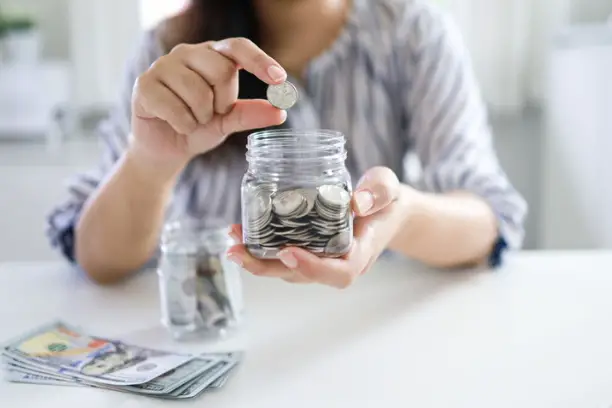Saving money is a significant aspect of personal finance that many people overlook. It is easy to get caught up in the fast-paced consumerist culture and spend more than we earn, often leading to debt and financial stress. However, implementing simple daily habits can help you save money and improve your financial wellbeing.
In this blog post, we will discuss eight daily habits that can help you save money. From making your own coffee to using cashback apps, these habits are easy to adopt and can have a significant impact on your finances in the long run.
So, whether you want to pay off debt, save for a home down payment, or just build your savings, these habits can help you achieve your financial goals. Without further ado, let’s dive into the eight daily habits that will save you money.
Habit 1: Make Your Own Coffee or Tea
Starting your day with a cup of coffee or tea is a common morning ritual for many people. But did you know that buying coffee or tea from a coffee shop or café every day can add up to a significant expense over time? By making your own coffee or tea at home, you can save money and still enjoy your favorite beverages.
On average, a cup of coffee or tea from a coffee shop can cost anywhere from $2 to $5, depending on the location and type of beverage. If you buy coffee or tea every day, this expense can add up to hundreds or even thousands of dollars a year. By contrast, making your own coffee or tea at home can cost as little as a few cents per cup.
Making your own coffee or tea is also easy and convenient. You can use a traditional coffee maker or French press for coffee, or a tea kettle or tea infuser for tea. There are also many easy and affordable options for making specialty coffee or tea beverages, such as lattes, cappuccinos, or iced tea.
In addition to saving money, making your own coffee or tea can also have a positive impact on the environment. By using fewer disposable cups and containers, you can help cut down on waste and make your lifestyle more eco-friendly.
So, if you’re looking for an easy way to save money every day, try making your own coffee or tea at home. It’s a simple habit that can have a huge impact on your financial situation..
Habit 2: Bring Your Own Lunch
Bringing your own lunch to work or school is another great daily habit that can save you money. Eating out every day can add up quickly, with the average cost of a lunch meal ranging from $10 to $15, but by preparing your meals at home, you can save a significant amount of money each week. Plus, you’re in charge of the ingredients and portion sizes, which can result in healthier eating habits.
Not only is bringing your own lunch cost-effective, but it also reduces the amount of waste generated from takeout containers and packaging. By using reusable containers and utensils, you can make a positive impact on the environment while saving money.
In addition, bringing your own lunch can also save you time during the workday. Instead of spending time waiting in line or driving to a restaurant, you can use your lunch break for other activities like taking a walk or catching up on work tasks.
To make bringing your own lunch more affordable and convenient, consider meal prepping or batch cooking. This involves preparing a large batch of food in advance, such as a soup or casserole, and dividing it into individual portions for the week. This not only saves time but can also help you avoid the temptation of eating out when you’re short on time or energy.
Habit 3: Shop Smart
Another daily habit that can help you save money is shopping smart. This involves being mindful of your spending and finding ways to cut costs on everyday purchases.
One way to shop smart is to buy generic or store-brand products instead of name-brand items. These products are often just as good as their more expensive counterparts, but can be significantly cheaper. Another way to shop smart is to compare prices between different retailers or online stores before making a purchase. This can help you find the best deals and avoid overpaying for a product.
In addition to these strategies, there are also several shopping apps and websites that can help you save money. Apps like Ibotta, Honey, and Rakuten offer cash back or discounts on purchases from popular retailers, while websites like RetailMeNot provide coupons and promo codes for online shopping. By taking advantage of these resources, you can save money without sacrificing quality or convenience.
Another way to shop smart is to be mindful of your purchasing habits. Avoid impulse buys and unnecessary purchases, and instead focus on buying only what you need. Consider making a shopping list before heading to the store and sticking to it to avoid overspending.
By shopping smart, you can save money on everyday purchases and make your money stretch further. With a little effort and mindfulness, you can make significant strides towards financial stability and independence.
Habit 4: Plan Your Meals
Planning your meals in advance can be an effective strategy for both saving money and maintaining a healthy diet. By planning your meals in advance, you can avoid last-minute trips to the grocery store or expensive takeout meals.
One way to start meal planning is by making a grocery list of the ingredients you need for the week. This can prevent you from making unnecessary purchases and cut down on food waste. When planning your meals, consider incorporating leftovers into your recipes to stretch your meals and reduce food waste. Batch cooking is another great way to save time and money by cooking large quantities of meals and freezing them for later use.
When grocery shopping, look for sales or discounts on items you regularly use. Plan your meals around these discounted items, and you can save even more money. Additionally, consider buying produce in season, as it’s often cheaper and fresher.
Meal planning can also help you eat healthier by encouraging you to make more nutritious choices. By planning your meals in advance, you can ensure that you’re getting a balanced diet and avoiding unhealthy fast food options.
In addition to saving money and improving your health, meal planning can also save you time. By planning your meals in advance, you can avoid the stress of last-minute meal prep and instead have more time to relax and enjoy your meals.
Overall, meal planning is an easy but efficient way to cut costs, eat well, and reduce food waste. By making this a regular part of your life, you can take big steps toward financial stability and better eating habits.
Habit 5: Maintain Your Belongings
Taking care of your belongings is not only good for the environment, but it can also save you money in the long run. By maintaining your belongings, you can prevent the need for costly repairs or replacements.
Regular cleaning and proper storage are keys to maintaining your belongings. For example, keeping your car clean and having it regularly serviced can prevent costly repairs down the road. Similarly, regularly cleaning and properly storing your clothing, shoes, and accessories can prolong their lifespan and save you money on replacements.
It’s also important to perform regular maintenance checks on your appliances, electronics, and other household items. By catching any potential issues early, you can avoid costly repairs or replacements. Additionally, proper maintenance can ensure that your belongings are functioning at their best, which can save you money on energy bills.
When purchasing new belongings, consider investing in high-quality items that are designed to last. While these items may be more expensive initially, they often pay off in the long run by lasting longer and requiring fewer repairs.
Overall, taking care of your belongings is a simple but effective way to save money and reduce waste. By incorporating this habit into your daily routine, you can enjoy the benefits of a clutter-free home, a longer lifespan for your belongings, and significant savings over time.
Habit 6: Avoid Late Fees
Late fees can quickly add up and eat into your budget. By making it a habit to avoid late fees, you can save money and avoid unnecessary stress.
Setting reminders for oneself is one of the simplest ways to avoid late fees. Utilizing a calendar app, a to-do list app, or a reminder app can assist you in remembering due dates for bills. It’s also a good idea to schedule payments a few days before they are due to ensure that they are processed on time.
Another way to avoid late fees is to sign up for automatic payments. Many companies offer this service, which allows you to automatically pay your bills on a set schedule. This can be a convenient way to ensure that your bills are always paid on time, and it can save you the hassle of manually paying each bill every month.
If you do end up missing a payment, it’s important to act quickly to avoid additional fees. Call the company, explain the situation, and ask if they can waive the late fee. Many companies are willing to work with you if you are a good customer and have a good payment history.
Avoiding late fees not only saves you money, but it can also improve your credit score. Late payments can negatively impact your credit score, so making it a habit to pay on time can help you maintain good credit and avoid additional fees and charges.
Overall, avoiding late fees is a simple but effective way to save money and reduce stress. By incorporating this habit into your daily routine, you can enjoy the peace of mind that comes with knowing your bills are always paid on time, and you can avoid the unnecessary costs of late fees.
Habit 7: Buy in Bulk
Buying in bulk can be a great way to save money on everyday items that you use frequently. By purchasing larger quantities of products, you can often get a lower price per unit, which can add up to significant savings over time.
When buying in bulk, it’s important to choose items that you will use frequently and that have a long shelf life. This includes non-perishable items like toilet paper, paper towels, and cleaning supplies, as well as food items like pasta, rice, and canned goods.
To make the most of buying in bulk, it’s important to store your items properly. This means keeping them in a cool, dry place away from direct sunlight and using airtight containers for food items to prevent spoilage.
Another benefit of buying in bulk is that it can reduce packaging waste. By purchasing larger quantities of products, you can reduce the amount of packaging that is used, which is better for the environment.
One potential downside of buying in bulk is that it can require a larger up-front investment. However, by planning ahead and budgeting for bulk purchases, you can save money over time and enjoy the convenience of always having a well-stocked pantry.
Habit 8: Buy Used
Last but not least on our list of daily habits that can save you money is buying used items. While it may be tempting to purchase brand new items, buying used can be a great way to save money while still getting the items you need.
Here’s how buying used can help you save:
- Lower prices: Used items are generally cheaper than brand new items. You can often find used items in good condition at a fraction of the cost of buying new. This can be particularly beneficial when purchasing big-ticket items like furniture, appliances, or electronics, where the savings can be significant.
- Reduced depreciation: Many items, such as vehicles and electronics, depreciate in value quickly after they are purchased new. By buying used, you can avoid the initial depreciation hit and potentially sell the item for a similar price if you decide to sell it later on.
- Bargaining power: When buying used items, you may have more room to negotiate the price with the seller. This can allow you to get an even better deal and save more money.
- Eco-friendly: Buying used items can be a more sustainable choice as it reduces the demand for new production, which consumes resources and energy. By purchasing used items, you are also helping to reduce waste and promote recycling.
- Durable quality: Some used items, particularly those made in the past, are often of better quality and durability compared to newer items. This means that buying used can be a cost-effective way to acquire durable goods that will last longer and potentially save you money in the long run by not having to replace them frequently.
- Unique finds: Buying used items can be an opportunity to find unique and exclusive items that may not be offered in brand-new stores. This can add character and personality to your belongings without breaking the bank.
- Lower costs of ownership: Used items may come with lower costs of ownership compared to new items, such as lower insurance premiums for a used car or lower property taxes for a used home. This can result in additional savings over time.
In conclusion, buying used items can be a smart financial decision as it can help you save money, reduce waste, and potentially acquire higher quality items. So, next time you need to make a purchase, consider checking out the used market to see if you can find a bargain and save some money in the process.
Conclusion
Having daily habits that help you save money can have a big effect on your financial situation in the long run. By making small changes to the way you live, you can cut your costs, save more money, and reach your financial goals.
To recap, the eight daily habits that can save you money are:
- Making your own coffee or tea
- Bringing your own lunch
- Shopping smart
- Planning your meals
- Maintaining your belongings
- Avoiding late fees
- Using cash back apps
- Buying in bulk
While each of these habits may seem small on its own, when combined, they can lead to significant savings over time. Consistency is key, so make sure to incorporate these habits into your daily routine and stick with them in order to see the best results.🍀✨
Read More:
- 101 Frugal Tips to Save Money
- 9 Bad Money Habits That Are Keeping You Poor
- 9 Frugal Tips to Live Below Your Means
- The One Habit You Need to Save Money
- 10 Things You Need to Stop Buying to Save Money Fast






